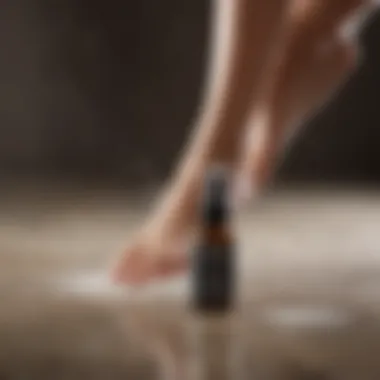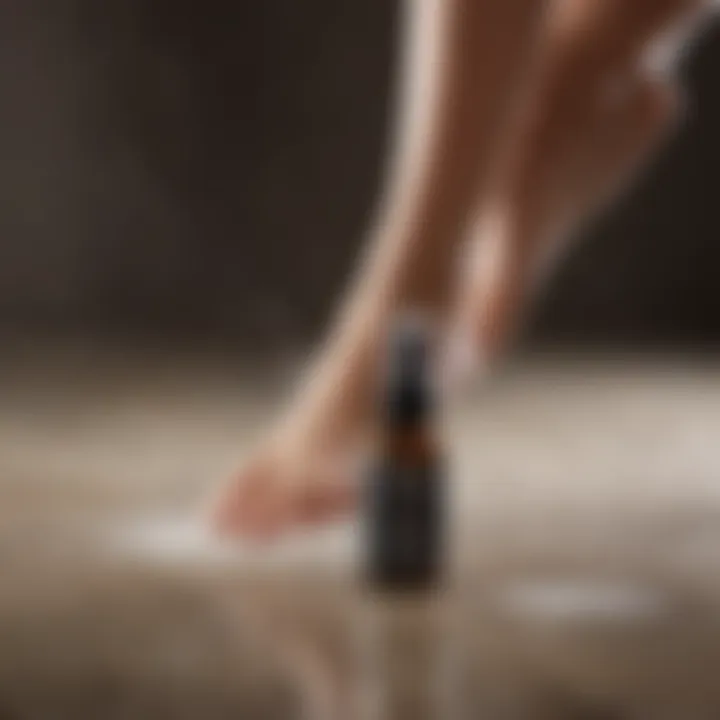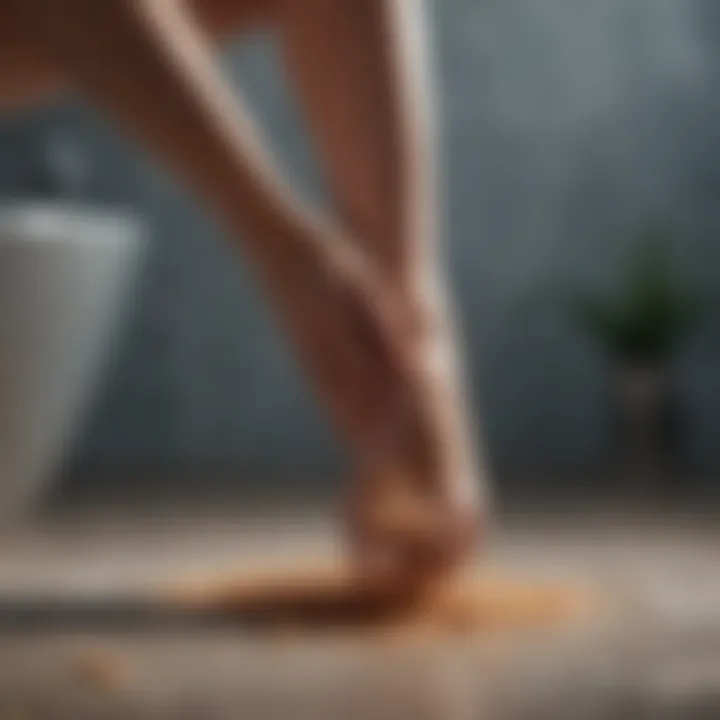Expert Tips: The Ultimate Guide to Banishing Stinky Feet for Good


Insider Beauty Tips
Stinky feet can be a bothersome issue for many individuals, causing discomfort and self-consciousness. Understanding the root causes of foot odor is crucial in combating this common problem. Whether due to excessive sweating, wearing improper footwear, or fungal infections, knowing the triggers enables you to implement targeted solutions to keep your feet fresh and odor-free.
Proper hygiene practices play a significant role in preventing and alleviating foot odor. Regularly washing and thoroughly drying your feet, especially between the toes, helps reduce bacterial growth and maintain cleanliness. Additionally, using antifungal powders or sprays can combat the growth of odor-causing fungi, promoting overall foot hygiene.
Footwear selection is another essential aspect to consider in the battle against stinky feet. Opt for breathable shoes made of natural materials to allow adequate ventilation and reduce sweat accumulation. Alternating between different pairs of shoes daily can also help prevent the buildup of moisture and bacteria, contributing to fresher-smelling feet.
Product Reviews
When it comes to skincare products for addressing foot odor, choosing those containing antibacterial and antifungal properties can be effective in combating odor-causing bacteria and fungi. Look for ingredients like tea tree oil, eucalyptus, or peppermint, known for their natural deodorizing and antimicrobial properties.
Makeup products may not directly target foot odor, but incorporating foot-specific sprays or powders with refreshing scents can provide a temporary solution to combat unpleasant odors. These products can help absorb excess moisture and neutralize odor, keeping your feet feeling and smelling fresh throughout the day.
Haircare products, while primarily focused on scalp and hair health, can indirectly impact foot odor. Strong-smelling shampoos or conditioners may leave lingering scents on bedding or footwear, potentially contributing to the perception of foot odor. Opting for milder, lightly scented hair products can help minimize any olfactory interference with foot hygiene.
Makeup Trends
The latest makeup trends may not directly relate to foot odor, but understanding seasonal makeup looks and celebrity beauty inspiration can inspire an overall self-care routine. Feeling confident and pampered through makeup application can positively influence how you perceive and care for your feet, promoting a holistic approach to personal hygiene and well-being.
Seasonal makeup looks may introduce color schemes or techniques that resonate with your style preferences, elevating your mood and confidence. Pairing these makeup trends with a comprehensive foot care routine can enhance your overall grooming regimen, fostering a sense of self-care and attention to detail.
Celebrity beauty inspiration provides a glimpse into glamorous and sophisticated styling choices that can extend beyond makeup to encompass overall personal presentation. Emulating these beauty icons' confidence and grace can motivate you to prioritize foot hygiene as part of your daily self-care practices, ensuring that your feet remain fresh and comfortable.
Beauty Industry News
Keeping abreast of new product launches in the beauty industry may uncover innovative solutions for foot odor. Collaborations between brands can bring about unique formulations or application methods that revolutionize foot care. Attending beauty events or following coverage can provide valuable insights into emerging trends and technologies for combating stinky feet.
Brand collaborations may introduce limited-edition products tailored to foot hygiene, incorporating novel ingredients or packaging designs. These partnerships can offer exclusive solutions to foot odor that cater to diverse preferences and needs, enhancing the overall consumer experience.
Beauty events coverage can showcase industry experts sharing expert advice on foot care and hygiene routines. Extracting key takeaways from these events can fine-tune your approach to combating stinky feet, integrating professional tips and practices into your daily regimen for improved foot health and freshness.
Understanding Foot Odor
Understanding foot odor is pivotal in addressing the pervasive issue of stinky feet comprehensively. By delving into the root causes and triggers of foot odor, individuals can implement targeted solutions to combat this nuisance effectively. This section will illuminate the diverse factors contributing to foot odor, ranging from sweat and bacteria to foot fungus, stress, and hormonal influences.
Causes of Foot Odor
Sweat and Bacteria
Sweat and bacteria play a crucial role in the manifestation of foot odor. The combination of moisture from sweat and the presence of bacteria on the skin's surface create a breeding ground for foul odors. Understanding how sweat interacts with bacteria is essential for formulating strategies to eliminate foot odor effectively. While sweat is a natural bodily response to regulate temperature, its interaction with bacteria can lead to malodor if not addressed promptly.
Poor Ventilation
Inadequate ventilation in footwear exacerbates foot odor by trapping sweat and bacteria, fostering an environment conducive to odor-causing microbes. Poorly ventilated shoes prevent adequate air circulation, leading to the accumulation of moisture and bacteria. Addressing ventilation issues in footwear is critical to mitigating foot odor and maintaining optimal foot hygiene.


Foot Fungus
Foot fungus, such as athlete's foot, is another common culprit behind persistent foot odor. Fungal infections thrive in warm, moist environments, making sweaty feet especially susceptible. Recognizing the signs of foot fungus and taking proactive measures to treat and prevent such infections are vital steps in combating foot odor effectively.
Stress and Hormones
Stress and hormonal fluctuations can impact the body's natural balance, potentially exacerbating foot odor. Increased stress levels can lead to changes in sweat production, while hormonal shifts may influence the body's odor profile. Understanding the interplay between stress, hormones, and foot odor is essential for implementing holistic odor-control strategies.
Impact of Foot Odor
Social Embarrassment
Foot odor can trigger social embarrassment and self-consciousness, affecting individuals' confidence levels and interpersonal relationships. Addressing foot odor not only improves personal comfort but also safeguards individual well-being in social settings. Effective foot odor management boosts self-assurance and promotes positive social interactions.
Health Concerns
Beyond social implications, foot odor can signal underlying health concerns such as fungal infections or excessive sweating. Neglecting foot odor may lead to more severe dermatological issues, underscoring the importance of proactive foot care. Monitoring foot odor can serve as an early warning sign for potential health issues, prompting timely intervention.
Quality of Life
The impact of foot odor on quality of life extends beyond physical discomfort, affecting emotional well-being and daily activities. Persistent foot odor can disrupt routines, decrease enjoyment in social engagements, and undermine overall quality of life. By addressing foot odor proactively, individuals can enhance their quality of life and cultivate greater self-confidence and comfort.
Effective Cleaning Practices
Efficiently cleansing stinky feet is pivotal in the endeavor to combat foot odor. Proper cleaning techniques not only rid the feet of unwanted bacteria and fungi but also contribute to overall foot health. The significance of effective cleaning practices lies in their ability to eliminate the root causes of unpleasant odors, thereby enhancing the individual's comfort and confidence. By incorporating a thorough cleaning routine into your daily regimen, you can greatly diminish the prevalence of foot odor and maintain a pleasant environment for your feet.
Proper Hygiene Habits
Maintaining proper hygiene habits plays a crucial role in combating foot odor. Consistent and thorough cleaning practices are essential for keeping bacterial growth in check.
Frequent Washing
Frequent washing of the feet is a fundamental aspect of proper hygiene. This practice helps remove dirt, sweat, and bacteria that accumulate throughout the day, preventing the onset of foul odors. Regular washing also promotes circulation and relaxation, contributing to overall foot health. By incorporating frequent foot washing into your routine, you can significantly reduce the risk of developing foot odor, ensuring fresh and pleasant-smelling feet.
Drying Thoroughly
Ensuring thorough drying of the feet post-washing is imperative in preventing moisture buildup, which can exacerbate foot odor. Properly drying between the toes and along the soles of the feet helps eliminate damp environments where bacteria thrive. Thorough drying also helps maintain skin integrity and prevents maceration, enhancing overall foot hygiene and comfort.
Trimming Toenails
Regularly trimming toenails not only ensures a neat appearance but also reduces the accumulation of dirt and bacteria. Long toenails can harbor debris and microorganisms, contributing to the development of foot odor. By keeping toenails trimmed to an appropriate length, you can minimize the risk of bacterial growth and maintain optimal foot hygiene.
Choosing Breathable Footwear
Selecting footwear made from breathable materials is essential in preventing foot odor. Breathable fabrics allow air circulation around the feet, reducing moisture and inhibiting bacterial proliferation. Choosing footwear with adequate ventilation helps maintain a dry and healthy environment for the feet, decreasing the likelihood of odors and discomfort.
Specialized Foot Soaks


Incorporating specialized foot soaks into your foot care routine can provide additional benefits in combating foot odor. These soaking solutions offer unique properties that help cleanse, soothe, and rejuvenate the feet, contributing to overall foot health.
Epsom Salt Soak
Epsom salt is known for its therapeutic properties and can help alleviate foot discomfort while cleansing the skin. An Epsom salt soak can reduce inflammation, relieve muscle tension, and promote relaxation. Additionally, the detoxifying properties of Epsom salt can aid in eliminating toxins, impurities, and odors from the feet, leaving them feeling refreshed and rejuvenated.
Apple Cider Vinegar Bath
Apple cider vinegar is a natural antimicrobial agent that can help combat bacterial and fungal growth on the feet. A foot soak containing apple cider vinegar can help restore the skin's p H balance, inhibit odor-causing bacteria, and soothe irritated skin. The acetic acid present in apple cider vinegar possesses antibacterial properties, making it an effective solution for neutralizing foot odors and promoting skin health.
Tea Tree Oil Solution
Tea tree oil is revered for its antifungal and antibacterial properties, making it a popular choice for foot soaks. A tea tree oil solution can help address fungal infections, reduce inflammation, and combat foot odor. The natural compounds in tea tree oil penetrate the skin to target microbial organisms, promoting a healthier foot environment and preventing unpleasant odors.
Baking Soda Foot Soak
Baking soda, or sodium bicarbonate, is a versatile ingredient that can help eliminate odors and soothe skin irritations. A foot soak containing baking soda can help neutralize acidic p H levels, reduce sweat production, and inhibit bacterial growth. The absorbent properties of baking soda also aid in absorbing moisture, keeping the feet dry and comfortable. By incorporating a baking soda foot soak into your foot care regimen, you can effectively manage foot odor and promote overall foot hygiene.
Exfoliation Techniques
Exfoliation is an essential component of maintaining healthy feet and preventing the accumulation of dead skin cells, bacteria, and odors. Utilizing exfoliation techniques can help rejuvenate the skin, improve circulation, and enhance the efficacy of foot care products.
Pumice Stone
A pumice stone is a natural exfoliating tool that helps remove dead skin cells and calluses from the feet. By gently exfoliating the skin, a pumice stone can promote cell renewal, improve skin texture, and prevent the buildup of bacteria and odors. Regular use of a pumice stone can help maintain soft, smooth feet and reduce the risk of foot odor.
Foot Scrubs
Foot scrubs are specially formulated products designed to exfoliate and moisturize the feet. These products typically contain abrasive particles that help slough off dead skin cells, revealing softer, healthier skin. Using a foot scrub can improve blood circulation, remove impurities, and enhance the absorption of foot care products. By incorporating foot scrubs into your foot care routine, you can achieve smoother, more radiant feet and mitigate the occurrence of foot odor.
Callus Remover
A callus remover is a targeted tool used to soften and remove callused skin from the feet. Calluses are thickened areas of dead skin that can harbor bacteria and contribute to foot odor. By using a callus remover, you can effectively reduce the buildup of hardened skin, enhance the appearance of your feet, and alleviate discomfort. Regular exfoliation with a callus remover can promote healthy skin regeneration and prevent the recurrence of foot odor.
Choosing the Right Products
Choosing the right products is crucial when combatting stinky feet. The proper products can make a significant difference in eliminating foot odor and ensuring long-lasting freshness. When selecting products for foot care, factors such as effectiveness, safety, and compatibility with your skin type should all be taken into consideration. Antifungal creams and powders, foot deodorizing sprays, and moisture-wicking socks are all essential components of a comprehensive foot care routine.
Antifungal Creams and Powders
Antifungal creams and powders play a vital role in tackling foot odor caused by fungal infections. They are specifically formulated to combat the growth of fungi on the feet, which can contribute to a foul odor. Three popular options in this category are Tinactin, Desenex, and Zeasorb.
Tinactin
Tinactin is a renowned antifungal product known for its potent formula that effectively treats fungal infections. Its key characteristic lies in its rapid action against fungi, providing quick relief for irritated and odorous feet. Tinactin's unique feature is its extended protection, which ensures long-term prevention of fungal growth. While highly effective, Tinactin may sometimes cause a slight drying effect on the skin, so moisturizing after use is recommended.
Desenex


Desenex is another trusted antifungal remedy that excels in combating foot fungus. Its standout feature includes a soothing effect that alleviates itchiness and discomfort associated with fungal infections. Desenex's unique formulation targets fungi at the source, eradicating them to prevent recurrence. However, prolonged use of Desenex may lead to skin irritation in some individuals, so it is advisable to consult a dermatologist if any adverse reactions occur.
Zeasorb
Zeasorb stands out for its ultra-absorbent properties that aid in keeping the feet dry and odor-free. Its main advantage lies in its ability to absorb excess moisture, which is often a breeding ground for fungi. Zeasorb's unique feature is its talc-free formula, making it suitable for individuals with sensitive skin. Despite its effectiveness, Zeasorb may leave a slight residue on the skin, necessitating thorough cleansing during regular use.
Foot Deodorizing Sprays
Foot deodorizing sprays are essential for maintaining fresh-smelling feet throughout the day. These sprays are designed to neutralize odor-causing bacteria and provide a pleasant fragrance. Gold Bond, Dr. Scholl's, and Odor-Eaters are popular choices that offer unique benefits in combating foot odor.
Gold Bond
Gold Bond is a reputable brand known for its deodorizing sprays that effectively eliminate foot odor. Its key characteristic is the long-lasting freshness it imparts, ensuring prolonged comfort for your feet. Gold Bond's unique feature includes ingredients like menthol, which provide a cooling sensation and fight bacteria. While Gold Bond is highly effective, individuals with sensitive skin may experience a mild tingling sensation upon application.
Dr. Scholl's
Dr. Scholl's deodorizing sprays are specifically formulated to combat odor and moisture, keeping your feet dry and pleasant-smelling. The key characteristic of Dr. Scholl's sprays is their dual-action formula, which targets both odor-causing bacteria and sweat. A unique feature of Dr. Scholl's products is the inclusion of antibacterial agents, ensuring thorough protection against microbial growth. However, individuals with respiratory sensitivities should use Dr. Scholl's sprays in well-ventilated areas.
Odor-Eaters
Odor-Eaters offers powerful foot deodorizing sprays that neutralize odors and provide a fresh scent. Its key characteristic lies in its odor-fighting technology, which tackles even the most stubborn smells. Odor-Eaters' unique feature is its moisture-absorbing properties, preventing sweat buildup and bacterial growth. While highly effective, prolonged use of Odor-Eaters may cause slight skin dryness in some individuals, necessitating the use of moisturizers.
Moisture-Wicking Socks
Moisture-wicking socks are a game-changer in preventing foot odor by keeping the feet dry and comfortable. These socks are designed to draw moisture away from the skin, reducing the likelihood of bacterial growth and odor. Options such as bamboo fibers, Merino wool, and nylon blends excel in providing superior moisture management and comfort.
Bamboo Fibers
Socks made from bamboo fibers are favored for their exceptional moisture-wicking properties, keeping your feet cool and dry throughout the day. The key characteristic of bamboo fiber socks is their breathability, allowing air circulation and preventing sweat accumulation. A unique feature of bamboo fiber socks is their natural antibacterial agents, which inhibit the growth of odor-causing bacteria. However, bamboo fiber socks may require delicate washing to maintain their softness and elasticity.
Merino Wool
Merino wool socks are renowned for their moisture-wicking capabilities and insulating properties, ideal for year-round wear. The key characteristic of Merino wool socks is their temperature-regulating feature, keeping your feet warm in winter and cool in summer. A unique feature of Merino wool is its softness against the skin, providing unparalleled comfort. While highly absorbent, Merino wool socks may require special care during washing to prevent shrinkage.
Nylon Blends
Socks made from nylon blends offer exceptional durability and moisture-wicking properties, making them ideal for active individuals. The key characteristic of nylon blend socks is their stretchability, ensuring a snug and comfortable fit. A unique feature of nylon blend socks is their quick-drying ability, allowing you to stay fresh even during intense physical activities. While highly resilient, nylon blend socks may show wear and tear over time, requiring periodic replacement.
Preventing Recurrence
Preventing recurrence of foot odor is a critical aspect that cannot be overlooked within the realm of combating stinky feet. By addressing the root causes and implementing practical strategies, individuals can significantly reduce the likelihood of experiencing persistent foot odor issues. One key element in preventing recurrence is to establish a consistent foot hygiene routine that includes thorough washing, drying, and proper ventilation. Additionally, incorporating foot-friendly practices such as regularly changing footwear and wearing moisture-wicking socks can help maintain optimal foot health and prevent the reemergence of unpleasant odors. By adopting these preventive measures, individuals can enjoy long-term relief from foot odor and enhance their overall foot care routine, ultimately improving their quality of life.
Maintaining Good Foot Hygiene
Maintaining good foot hygiene is fundamental in the battle against foot odor. This includes daily washing with antibacterial soap, ensuring thorough drying, especially between the toes, and applying foot powders or antifungal creams as needed. Regular exfoliation using a pumice stone can help remove dead skin cells and reduce bacterial buildup, further promoting foot freshness. It is also advisable to trim toenails properly to prevent ingrown nails and bacteria accumulation. By prioritizing consistent foot hygiene practices, individuals can effectively combat foot odor and prevent its recurrence, contributing to overall foot health and well-being.
Regularly Changing Footwear
The significance of regularly changing footwear cannot be overstated when aiming to prevent foot odor. Wearing the same shoes daily can lead to sweat and bacteria accumulation, creating an optimal environment for odor-causing microbes to thrive. By rotating between different pairs of shoes and allowing each pair to air out completely between uses, individuals can minimize moisture buildup and bacterial growth. Additionally, choosing breathable footwear made of natural materials like leather or mesh can enhance air circulation and reduce dampness, further preventing foot odor development. By maintaining a diverse shoe collection and practicing proper footwear rotation, individuals can effectively combat lingering foot odor issues and promote overall foot health.
Consulting a Dermatologist
Seeking guidance from a dermatologist is a prudent step for individuals dealing with persistent foot odor concerns. Dermatologists can provide expert advice on underlying skin conditions that may contribute to foot odor and recommend specialized treatments tailored to specific needs. Additionally, dermatological evaluation can help rule out fungal infections or other dermatological issues that may exacerbate foot odor. By consulting a dermatologist, individuals can receive personalized care and comprehensive solutions to address stubborn foot odor, enhancing their overall foot health and well-being.







